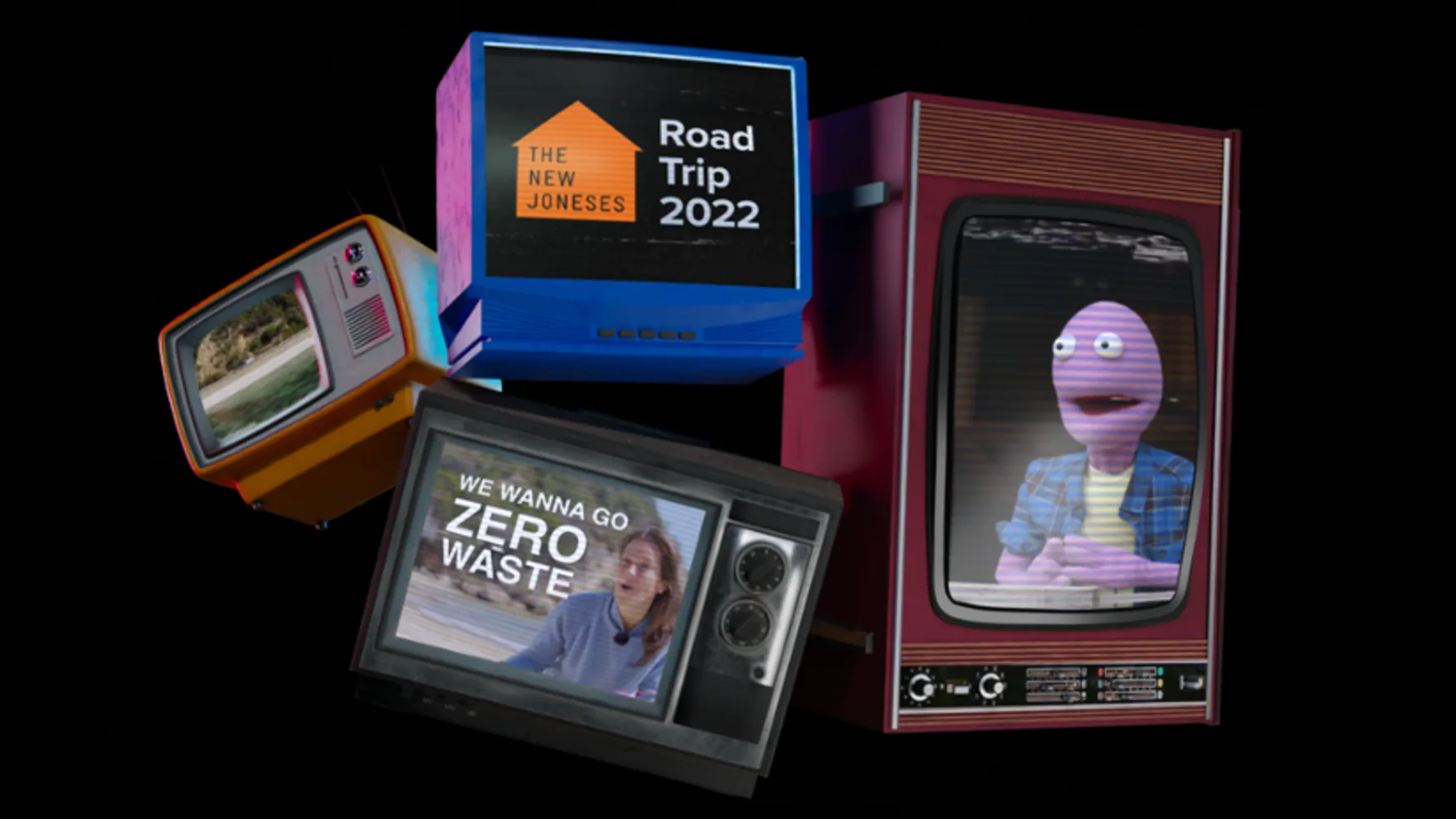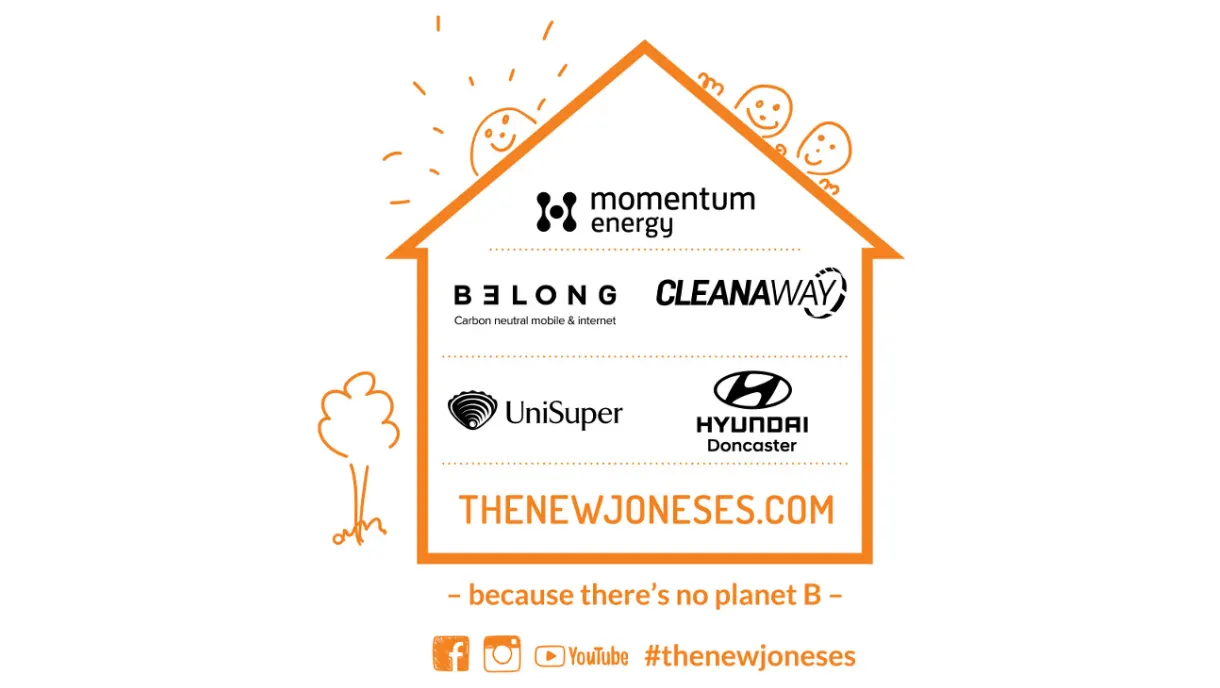
Find simple ways to go green with The New Joneses
It’s never been more important to do our part to go green. Our climate is changing – temperatures are rising, extreme weather events are becoming more common, glaciers are melting. That’s why we became Australia’s first carbon neutral telco.
But here’s some more good news: we can all be part of the solution, and The New Joneses are going to show us how.
For more than a decade, The New Joneses have been helping people make a difference to the environment. Their top tips to live a little greener:
🍏 Eliminate food waste
💬 Get started
📢 Get involved
🌱 Nurture nature, gift native plants
🔌 Get off gas, go all electric
✏️ Educate girls
☀️ Support renewables, cut carbon
♻️ Avoid packaging, recycle right
👚 Shop less, buy nothing new
On their road trip, The New Joneses dive deeper into how each of these easy actions contribute to positive change.
Let's check out their adventures and get sustainable.
Eliminate food waste
We create a lot of food waste (and it’s a bigger problem than you’d expect).
Food scraps that end up in landfill can’t break down, and instead create toxic methane. If food waste was a country, it would be the third largest generator of emissions in the world.
What our once delicious leftovers do make for, however, is great soil. And that’s exactly what Yume Food founder Katy Barfield wants us to do with our food waste.
Get a worm farm, compost, get some chickens, blend scraps and dig them back into the soil, or treat your furry friend to an appropriate second dinner when you can’t finish yours. Just don’t ditch your old food into landfill.
Get started
Climate change affects so many elements of our lives, including the sports we love to play and watch.
Tom Campbell and Jasper Pittard founded AFL Players for Climate Action after the Black Summer bushfires. The smoke impacted their training, and the devastating images of the damage across the country propelled the two into action.
When it comes to making change, one of the best things to do is to just get started. Educate yourself, join a local organisation, have a conversation with your mates, ask your workplace what they’re doing to reduce their impact on the planet, and ask ‘can we do better?’
Get involved
Many say ‘I’m just not into politics’ but apathy won’t stop the price of avo on toast soaring. That could happen pretty quickly as agricultural practices change to adapt to changing weather patterns.
Linh Do reminds us that we have the power to effect political change (without being a politician) by having our say. Get informed. Find out who your local representative is, and ask them what they’re doing about climate change. Let them know what you think. We vote for politicians to make decisions for us, so let them know you want action on climate change.
Show up. Speak out. Step up. Do something to improve your community, your apartment block, your school or work place. Just get involved!
Nurture nature, gift native plants
A healthy biodiversity helps regulate the climate and provides clean air and water, healthy plants and soil required to grow the food we eat.
Zena Cumpston, Barkandji woman and Research Fellow cares a lot about country: the land, the waters, the seas, the sky, the air, the rocks. Native plants are the life support system for the biodiversity that supports our life on Earth.
Notice and nurture nature every day. Gift native plants. Look up nurseries near you and ask for local natives, indigenous to your area. Natives save time, money and resources (they need little maintenance, pesticides, or water). Provide nest boxes or water bowls for thirsty birds, plant local native grasses or flowering shrubs, providing a sanctuary for ‘the little things’.
Get off gas, go all electric
Opting for electric is a great way to lighten your load on the planet.
Randy Feltface explains that getting off gas in our cars and our homes is big part of our renewable energy transition.
How to go all-electric? Bit by bit. Go solar (rooftop solar electricity is often cheaper than grid prices). Swap your gas stove for induction. Replace gas hot water with heat pumps. Choose reverse cycle aircon to heat and cool your home.
Go electric to keep things cool, cool, cool.
Educate girls
Educating girls is one of the most powerful, yet overlooked, tools we have against climate change.
Dr Chrisanta Muli, CEO of One Girl, explains that when you educate a girl, you educate a community and empower her to be part of the solution to the climate crisis. When a girl is educated, she can help make decisions for herself and her family that help respond to climate change.
For the cost of a coffee a day, you can support one girl’s education, creating a space where girls can be the future innovators, scientists, leaders and mothers who ensure that climate action is at the forefront on their lives.
Support renewables, cut carbon
Excess fossil fuel burning (coal, oil, gas) leads to a buildup of greenhouse gases in the atmosphere.
Tony Wolfe has worked in coal for 40 years, and now he’s calling for us to leave fossil fuels in the ground and switch to renewables.
It’s easier than it sounds to play your part.
Choose banks and super funds that don’t invest in fossil fuels. Switch to an energy company that’s powered by renewables. Consider switching to a carbon neutral telco (hint hint... Belong is Australia’s first certified carbon neutral mobile and internet provider).
Avoid packaging, recycle right
Healthy people need healthy oceans.
The health of our ‘blue backyard,’ as Marine Biologist and Science Communicator Sheree Marris calls it, is essential to life on Earth. The oceans provide food, regulate our climate and absorb huge amounts of carbon from the atmosphere.
Only 9% of all plastic ever made has been recycled, meaning that lots of it ends up in landfill or in our oceans.
Avoid excessive packaging, and recycle things properly – put paper, cardboard, glass, tin, and hard plastics (milk cartons) dry, clean and unbagged into the yellow bin. Take soft plastics to the special drop-off points in your local super market.
Shop less, buy nothing new
Our throwaway culture drives climate change.
Everything we buy takes energy and resources to make. We are currently consuming 70% more virgin materials than the world can replenish. But, there’s a wonderful alternative that’s good for our people, planet, and our pockets.
For nearly two decades, Buy Nothing New Month founder Tamara DiMattina has bought nothing new. She wants us to do the same.
So much of what we need to buy already exists. A circular economy helps us reimagine our relationship with the things we already have. Share, swap, borrow, fix, and extend the life of the goods we’ve already got.
It feels good to do better for people and the planet
Nine eco-friendly tips so easy, you can get started today! It feels good to do our part to take care of the Earth, because there’s no planet B.

Belong has partnered with The New Joneses to help encourage sustainable switches. For more information and tips on how we can do better for the people and the planet, head over to The New Joneses website. It feels good to search the world wide web while helping the real wide world. You can get a carbon neutral mobile or internet plan with Belong.